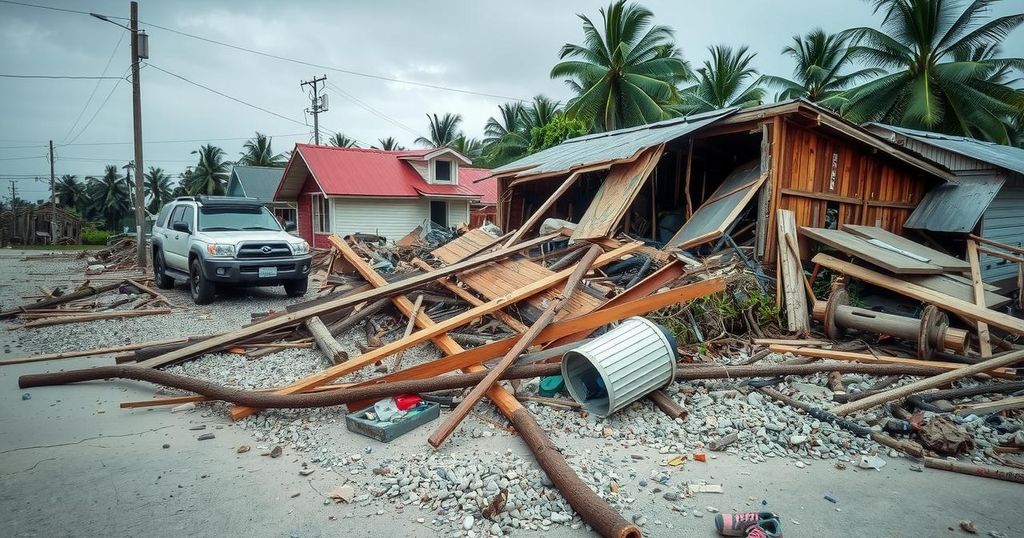Cyclone Chido, the most destructive storm to strike Mayotte in 90 years, has caused significant loss of life and widespread devastation, particularly among impoverished areas. Initial reports confirm at least twenty deaths, with numbers expected to rise as recovery operations are ongoing and hindered by damaged infrastructure and high numbers of undocumented migrants. Local communities face severe shortages of essential resources, prompting urgent calls for aid and support from the government and international agencies.
Residents of Mayotte have described their homeland as bearing the scars of a nuclear war following the devastating impact of Cyclone Chido. This storm, the most severe to strike the region in nearly a century, unleashed wind speeds exceeding 225 km/h (140 mph), resulting in widespread destruction of homes primarily constructed from sheet metal, where the most vulnerable populations resided. Reports indicate that the initial death toll stands at twenty, yet local officials warn this figure could escalate into the hundreds, potentially even thousands, as recovery efforts unfold amidst significant logistical challenges.
The capital city of Mamoudzou has been particularly hard-hit, with residents voicing urgent concerns over the availability of basic necessities such as drinking water and food. “We have had no water for three days now. Some of my neighbors are hungry and thirsty,” lamented one local. As rescue operations commence, aided by reinforcements from France, the situation on the ground remains dire. Approximately 85% of the territory is without power, and conditions have severely hindered emergency response efforts, with roadways blocked and essential services disrupted.
Efforts are complicated by the fact that a significant portion of Mayotte’s population comprises undocumented migrants, estimated to number over 100,000. This demographic reality further obscures accurate accounting of the casualties inflicted by the cyclone. As the healthcare system grapples with a deteriorating situation, local hospitals face increasing strain, with urgent calls for assistance. The acting French health minister has highlighted the degradation of medical services in the aftermath of the cyclone, signaling the need for immediate intervention.
As rescue workers face substantial hurdles, supplies such as food and water have begun to arrive, yet distribution remains problematic. Many individuals, including healthcare workers, have reported that sanitation has significantly declined, with some water sources contaminated. Amid this chaos, those in impoverished communities, which constitute a considerable part of the island’s populace, are feeling particularly neglected. Local officials continue to monitor the situation closely, anticipating that the full extent of the disaster will only be clear in the coming days and weeks.
The cyclone also had implications beyond Mayotte, impacting regions in Mozambique where flooding and structural damage were reported. The storm has since weakened but may still pose a risk of heavy rainfall as it continues its journey across southern Africa. In light of the compounded challenges that climate change presents, experts emphasize the need for robust preparedness and response strategies for future storms of similar magnitude.
Cyclone Chido is the latest in a series of powerful storms that have impacted various regions globally, particularly in the Indian Ocean. Mayotte, a French overseas territory, has experienced significant storms in the past; however, this cyclone is noted as the worst in ninety years, raising concerns about infrastructure resilience and emergency preparedness. Mayotte’s socio-economic conditions complicate recovery efforts, as a large proportion of its population lives below the poverty line, and many are undocumented migrants lacking access to essential services. Understanding the cyclone’s impacts requires a look into the historical context of Mayotte’s colonization, its dependency on French aid, and the broader implications of climate change on weather patterns.
In conclusion, Cyclone Chido has inflicted catastrophic damage on Mayotte, leaving its residents in dire need of relief and support. The combination of infrastructural devastation, limited resources, and a vulnerable population, exacerbated by the presence of undocumented individuals, has presented significant obstacles to recovery efforts. The event serves as a critical reminder of the vulnerabilities faced by island communities in the face of climate change and the necessity for comprehensive disaster preparedness and response strategies. Local and international efforts must converge to address the urgent humanitarian needs and facilitate a coordinated response in the aftermath of this disaster.
Original Source: www.bbc.com






